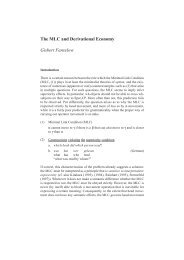Malagasy Adverbs Andrea Rackowski McGill University August 1996
Malagasy Adverbs Andrea Rackowski McGill University August 1996
Malagasy Adverbs Andrea Rackowski McGill University August 1996
Create successful ePaper yourself
Turn your PDF publications into a flip-book with our unique Google optimized e-Paper software.
In The Structure of <strong>Malagasy</strong>, Volume II , ed. Ileana Paul, UCLA Working Papers in Linguistics, 1998.<br />
restrictions would have to be lexically specified as occurring pre- or post- verbally. In<br />
this case, there would be no syntactic account for the fixed orders that do exist. It would<br />
definitely be more desirable to treat all of the AdvPs similarly, leaving them in some<br />
fixed order as a result of their base location.<br />
The different tsy orders are best explained by the presence of two NegPs in<br />
<strong>Malagasy</strong>, one before efa and one after mbola. Because both orders of adverb and<br />
negation have sentential scope, the presence in the tree of two separate locations for<br />
negation is logical. Rather than trying to move the adverbs into each other’s Specs and<br />
then having to account for their ability to maintain scope over the entire sentence from an<br />
embedded position, if the basic order of adverbs is tsy> efa> mbola> tsy, most of the<br />
word order facts fall out correctly.<br />
The existence of two separate NegPs has also been proposed for other languages.<br />
Cinque mentions it in his forthcoming work as a solution to a puzzling French word<br />
order. Pas and guère do not occur in the same position, as is evident in the following<br />
examples (plus follows pas).<br />
(48) a. Je ne pourrai (*guère) plus (guère) venir.<br />
"I could not come anymore (much)."<br />
b. Il n'a (*guère) toujours (guère) accepté.<br />
"He has not always accepted (much)."<br />
c. Il n'a (?guère) completement (*guère) perdu la tête.<br />
"He has not (much) completely lost his mind."<br />
d. Il n'a (?guère) tout (guère) mangé.<br />
"He has not (much) eaten everything."<br />
He states,<br />
Guère does not appear to occupy the same position as pas. It follows plus and<br />
toujours, while preceding completement and tout...A lexical infinitive can precede<br />
guère...but not pas. Guère would seem to be the negative counterpart of quantity<br />
adverbs like beaucoup, peu, trop, etc., but...it does not appear in the same<br />
position. While the latter are found between the passive and the lexical past<br />
participle (Ce livre a été beaucoup/peu lu l'année dernière 'This book has been<br />
much/little read last year'), guère has to precede both (ce livre n'a guère été lu<br />
l'année dernière 'This book has not been read last year')...All this suggests the<br />
presence of a second NegP, lower than that hosting pas/mica.<br />
Although the adverbs discussed by Cinque are different from the pre-verbal tsy in<br />
question here, the possibility of two or more NegPs in a sentence is plainly supported,<br />
and the different positions of the two tsys (before and after efa and mbola) are similar to<br />
the location differences of plus and guère. The existence of two NegPs is also argued in<br />
Zanuttini (to appear) for Milanese and Pavese, as well as in Brugger and Poletto (1993)<br />
for German.<br />
Further support for this proposal comes from Ouhalla (1990) (also Laka (1990)),<br />
who argues that languages can behave either like English and have the order AgrP> TP><br />
AspP> NegP> VP, or like French with the order AgrP> NegP> TP> AspP> VP. It is a<br />
logical extension from this proposal of two choices of location for NegP to simply allow<br />
11
















